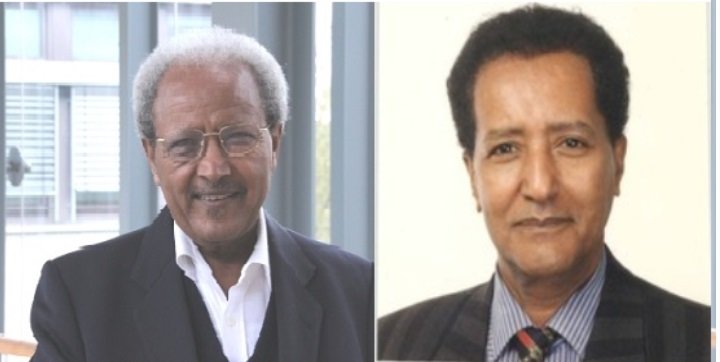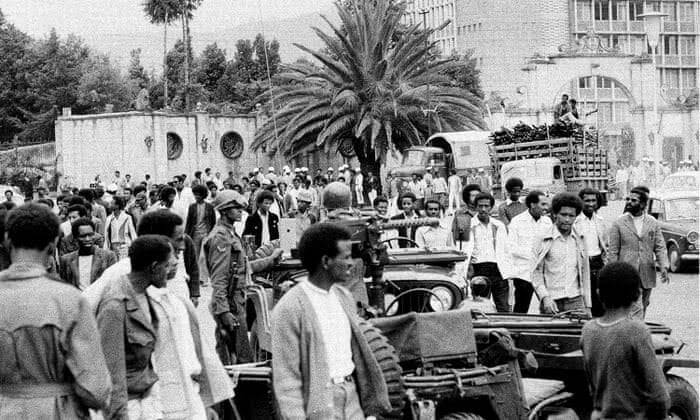
Tesfatsion Medhanie Ph.D. and
Paulos Milkias Ph.D.
Introduction
Assuming that the majority of our readers are Ethiopia’s Gen X and Millennials, the two of us, Tesfatsion Medhanie and Paulos Milkias, who passed through the turbulent periods of the Ethiopian Revolution, want to offer testimonials that our colleagues who martyred themselves could not. Here is our profile and first-hand experience to augment the dynamic exchange between Professors Messay Kebede and Worku Abera with regard to the Ethiopian Student Movement. We also hereby invite others with similar experiences to come forward and teach Ethiopia’s younger generation about our fulfilled and unfulfilled dreams. Keep in mind that our fallen comrades shuddered with indignation at every injustice they witnessed in the motherland, and with their audacious sacrifice, they opened a venue for a new dawn that is yet to burgeon. Let us be worthy of them. Let us be at least honest witnesses.

Tesfatsion Medhanie, a notable figure in academia, is one of the very few African professors in Germany, where he taught at the University of Bremen. Renowned predominantly for his scholarly contributions concerning Eritrea, Tesfatsion epitomizes a particular echelon of Ethiopians and Eritreans, often lauded as “the Generation” within the annals of the Ethiopian student movement. From the onset of his tenure at Addis Ababa University (then HSIU) in 1964, Tesfatsion’s engagement with the student body burgeoned into an indelible legacy. He was immersed in the pulsating activities of the student government, embodying a fervent commitment to the causes he and his radical colleagues championed. During the pivotal period of 1964-65, Tesfatsion assumed the role of Reporter for News and Views, an appointment that granted him a platform to chronicle the historic “Land to the Tiller” demonstration, a watershed moment in the nation’s narrative. Transitioning seamlessly into 1965, Tesfatsion’s dedication to student affairs saw him as an active participant within the Debating Society, offering invaluable support to the esteemed Abdulmejid Hussein, who then presided as President. By the dawn of 1966, Tesfatsion ascended to the pinnacle of leadership within the Debating Society, assuming the presidency, and served as a stalwart member of the Executive Council of the Main Campus Student Union (MCSU), under the stewardship of the late Professor Eshetu Chole.
The annals of Tesfatsion’s tenure resonate with the echoes of impassioned activism and intellectual fervor. The Council he was part of orchestrated a series of transformative demonstrations, notably including the poignant protest staged with regard to the Shola concentration camp. Moreover, the organization played host to a myriad of cultural competitions, epitomized by the electrifying Amharic poetry contests, where politically charged verses reverberated throughout the hallowed halls of the university. Among the luminaries who graced these gatherings were the illustrious Walelign Mekonnen, Ibsa Gutema, and Abebe Worke, whose impassioned recitals stirred the hearts and minds of all in attendance.A defining moment for Tesfatsion unfolded during the culmination of an Amharic poetry contest within the confines of Ras Mekonnen Hall, where fervent spectators remained transfixed until the late hours of the night, ensnared by the enchanting verses echoing within. It was a night etched in crimson ink in the annals of his memory, emblematic of his unwavering commitment to progressive discourse and fervent activism.
Paulos Milkias, presently a professor of political science at Concordia University in Montréal, Canada, previously served as an expert in history and information in the administration department of the Ministry of Defence of Ethiopia. Dr. Paulos holds an MA and Ph.D., the latter of which he earned on the Dean’s Honour List from McGill University, where he was bestowed with the esteemed Canada Council Doctoral Fellowship. Dr. Paulos’ involvement in political activism spans a period of several decades. Notably, he played a pivotal role in the student demonstrations supporting the abortive Mengisru and Germamie Neway coup d’état, where the monarchist military faction nearly perpetrated a massacre at La Gare station. Dr. Paulos made history by being the first individual in Ethiopian intellectual discourse to advocate for the ideological worldview of Socialism as a conduit for Africa’s and Ethiopia’s salvation. During his tenure as President of the University College Debating Society, he orchestrated radical poetry readings to foster political conscientization among the populace. Additionally, he was a clandestine member of a socialist movement under the leadership of Haile Fida, maintaining an underground library reading room adjacent to the Lutheran Church near Amist Kilo. Throughout the mid-1960s, Dr. Paulos contributed significantly to organizing various student demonstrations and played a pivotal role in the establishment of the University Students Union of Addis Ababa (USUAA), where he served as its inaugural chairperson. He was also instrumental in the inception of the radical student publication, Struggle. Dr. Paulos has contributed scholarly works elucidating the pivotal role of student activism in toppling Haile Selassie’s feudal regime, as evidenced in his monograph, Haile Selassie Western Education and Political Revolution in Ethiopia (Cambria Press in 2006.) Furthermore, his scholarly endeavors include the notable volume Africa in Focus: Ethiopia (Oxford: ABC-CLIO, 2011,) which has been recognized and curated by the Smithsonian Institution. Upon relocating to McGill University in 1968, Dr. Paulos remained actively engaged in student activism, notably participating in the organization of a sit-in protest within the Political Science and Economics department of McGill. This event, in conjunction with radical US Vietnam draft dodgers such as Ted the Red and the guidance of luminaries such as the renowned development theory pioneer Dr. Emanuel Wallerstein, led to the division of the department. This demonstration, captured by the National Film Board of Canada, became symbolic of the global student unrest witnessed in France, the United States, and Canada during the tumultuous year of 1968. In his capacity as both activist and scholar of Third World Politics, one of his seminal works being Developing the Global South; a United Nations Prescription for the Third Millennium, (Algora Publishing 2009,) Dr. Paulos has been sought after for interviews by prominent international media outlets, including but not limited to the BBC, CBC, Radio Canada International, CTV, ABC, Fox, VOA, and ETV.
N.B. This is an introduction. Details of the testimonials will follow next.
.

First of all, I would like to congratulate both these two well read gentleman for escaping unscathed the bloody mayhem their generation endured in 1970’s. I also hope that, in retrospect, they have learned a lesson of two from what their generation experienced in 1960’s and 70’s. The two gentlemen started out in one and same country but now they belong to two sovereign countries. Was that what they set out to do in the 1960’s and 70’s? May be not for both or may be just for one of them, that was the plan. In any case, my best advice for both of them is to stay with in the confines of their internationally recognized countries. One should never interfere in the internal affairs of the other countries. They should maintain their decades long friendship but keep that within in the realm of personal. I have friends who are Somalis, Sudanese and of course, Eritreans(formerly Ethiopians). We keep within the boundaries of personal friendship. My children grew up calling them uncles and aunties and their children call me and my wife the same.
Now, I’m eagerly waiting for their Part II article.
Blessings to you and your families!